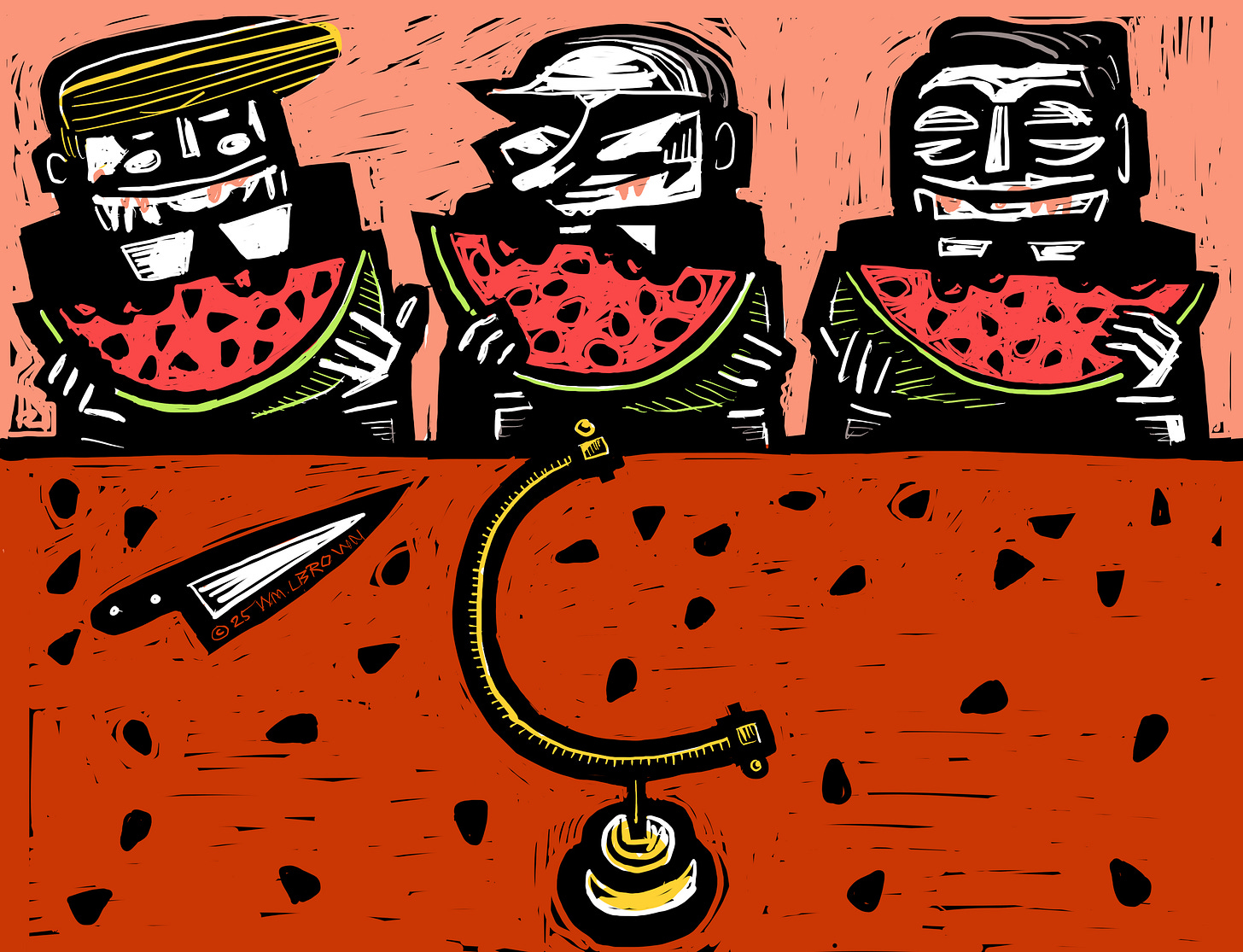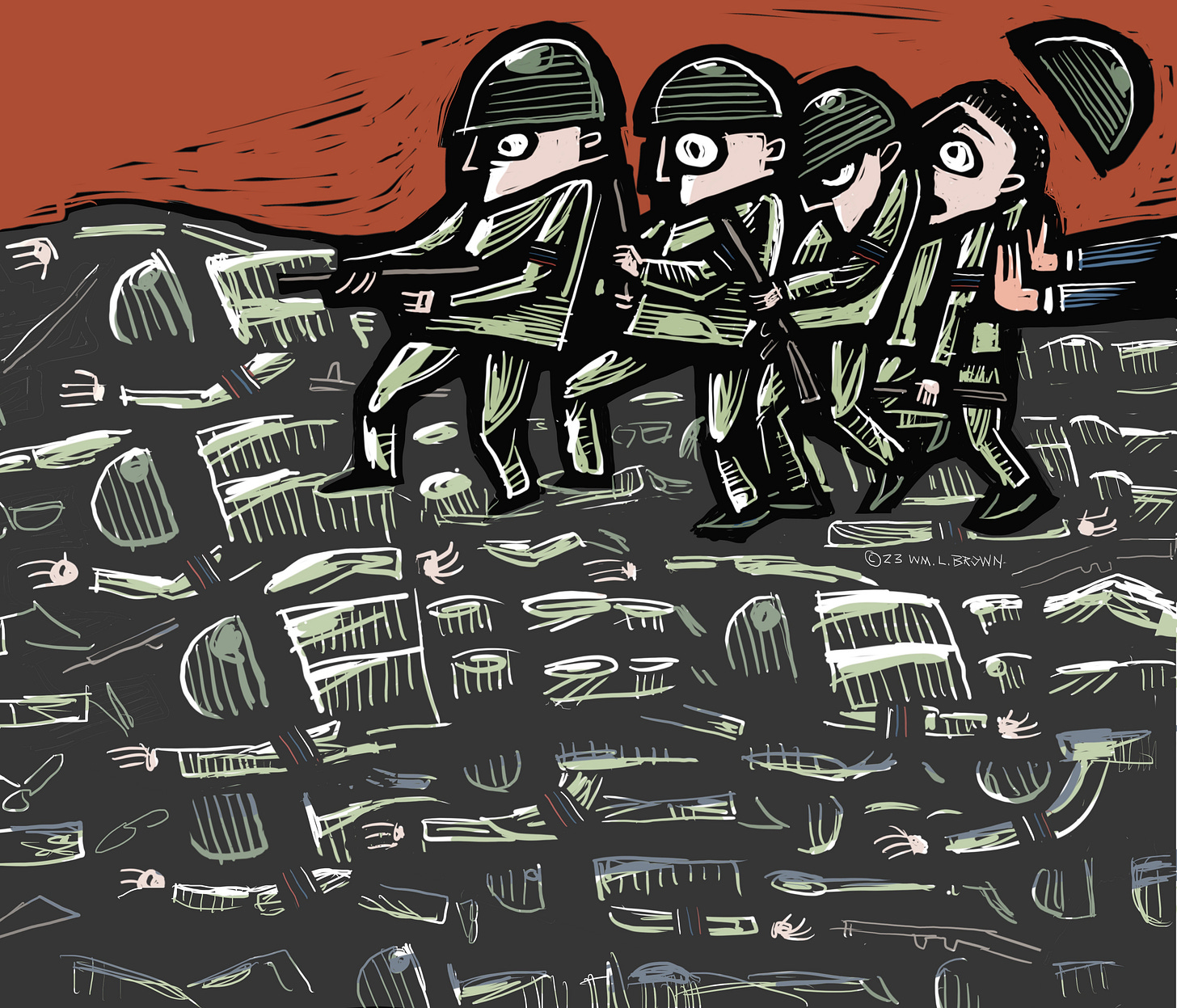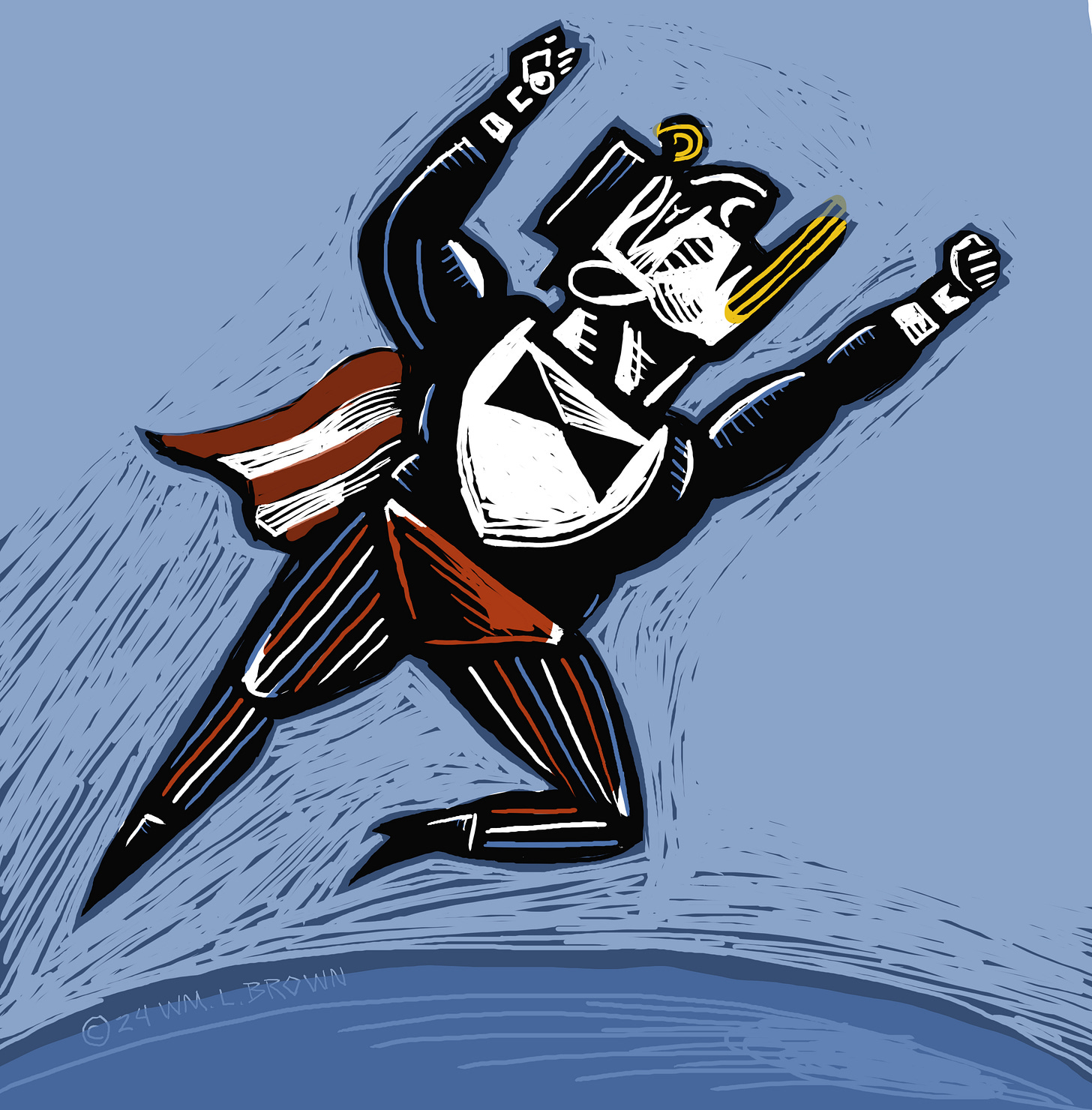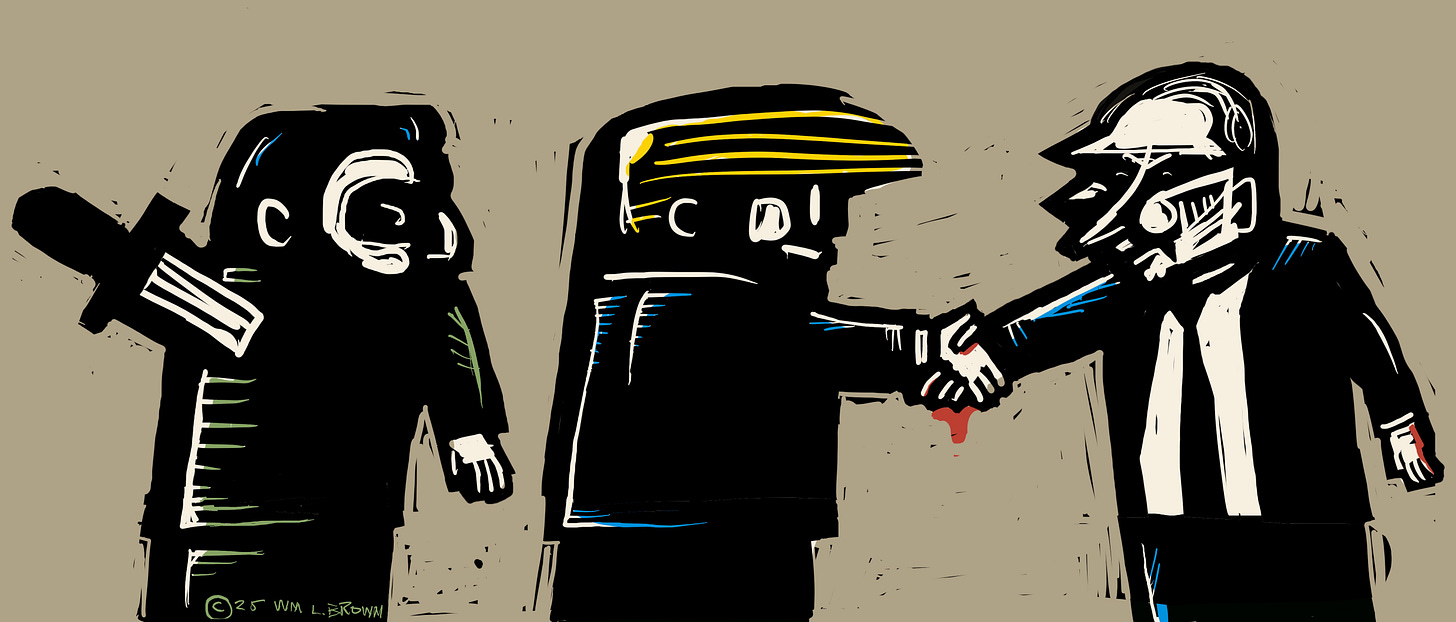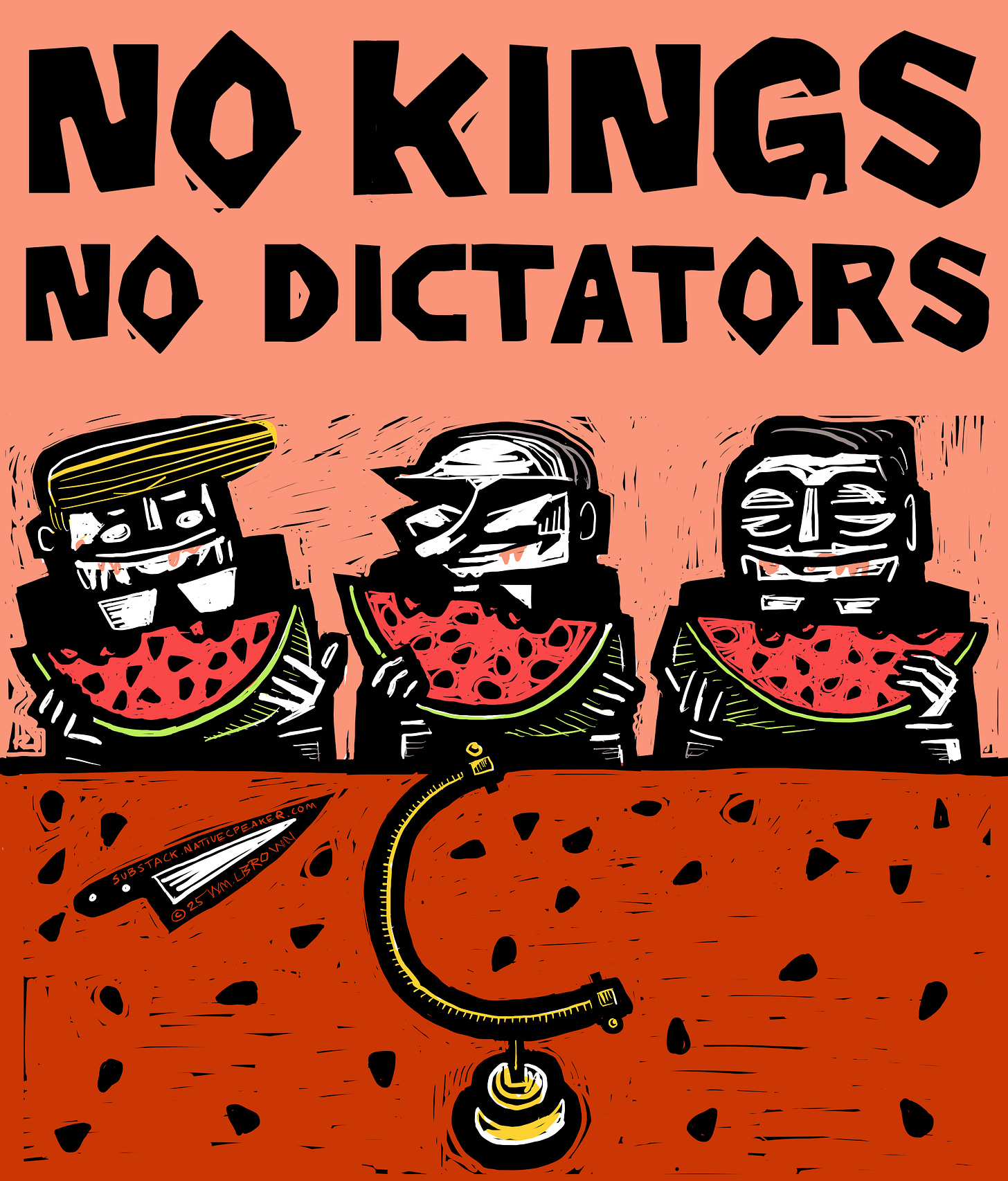Sphere weather forecast
Trump's turrets-syndrome
Multipolar, ©2025 William L. Brown
”You know, Ukraine had the most beautiful turrets. They call them turrets — little towers, beautiful towers. The most beautiful in the world. They’re all now laying on their side, blown to smithereens. It’ll never happen again. They’ve taken away the culture of a country. They’ve taken away the heritage of a country. It’s a terrible thing. But most importantly, again, is the death. Five thousand-plus people a week, soldiers, are being killed. He doesn’t want that, and I don’t want that.”
The quote is from President Donald Trump speaking to German Chancellor Friedrich Merz at their Oval Office meeting in early June.
The quote reveals Trump’s ignorance, over-simplification and misplaced self-confidence.
By “beautiful turrets” he apparently means church cupolas or domes. They are not “all now laying on their side, blown to smithereens.” Churches on the front line have been destroyed, yes, but most of Ukraine is still standing and functioning fairly normally.
Trump’s main point—that Putin doesn’t want five thousand soldiers dying every week (“He doesn’t want that')‘]—is completely wrong.
Putin DOES want five-thousand of his own soldiers dying every week. He orders them to do exactly that. Sending them to die in waves of “meat assaults” is a deliberate tactic, designed to force Ukraine to use up all it’s ammunition. Any average citizen who has read a news report knows this. The President of the United States does not. The man who has the power to force either Ukrainians or Russians to capitulate is delusional.
Because he has that power, everyone, especially those whose lives hang in the balance, tries to understand Trump’s mind. It is a frustrating endeavor.
Based on quotes like the above, it seems he has no rational mind at all. Outside of his limited interest areas he has limited, ill-informed understanding which he mistakes for brilliant insight.
How, then, can we understand his Ukraine policy? It’s an important question to any American who wants to influence that policy so Ukraine gets a just peace.
It’s not that Trump is in thrall to Putin. Social media is full of theories about him being a Russian asset. But, Trump-as-Russian-asset is less plausible than Trump motived by profit, as he would from opening Russia’s economy.
Other theories include crazy-like-a-fox. Trump, proponents say, is keeping Russia and the rest of the world off balance by saying and doing unexpected, unpredictable things, that he’s drawing Russia in with promises of lifted-sanctions and deals, but eventually the fox will pounce, using those promises as negotiating points to force a peace settlement. This seems less and less likely as time passes and he doesn’t pounce.
Trump’s resentment of Zelensky may be a factor. He blames Zelensky for his (unwilling) part in Trump’s 2019 impeachment. Trump feels a strong bond with Putin because, he says, both were unfairly accused and persecuted in that impeachment. Trump is notoriously for holding grudges and taking revenge.
One Mouth, ©2025 William L. Brown
The evidence, however, most aligns with an ideological motivation. Consider the following.
He refuses to strong arm Russia, he strong-arms Ukraine instead. He always considers or references the Russian point of view, even when it is false or duplicitous. He broke international isolation to meet with Putin and begin negotiations to normalize relations and trade. It’s not because he’s on their side, it’s because he thinks that within the Russian sphere, Russia sets the rules and policy.
Trump is not acting as a Russian asset so much as he is pushing Ukraine to submit to Russian domination.
In his election campaign Trump railed against the US spending billions on Ukraine, citing America First principles. What stopped him from instantly abandoning Ukraine was the knowledge that it would be seen as US weakness, similar to Biden’s abandonment of Afghanistan. And he knows Ukraine gets a lot of bipartisan sympathy.
His solution was a promise to broker a peace deal between Ukraine and Russia “I will have the deal done in one day,” he said during the campaign. His slogan “peace through strength” gave hope to Ukraine supporters that Trump would use US strength to pressure Putin into a deal.
He has yet to do so, bringing pressure on Ukraine instead. He hasn’t publicly ordered Zelenski to capitulate, but that’s what most of his actions suggest.
It’s tough to know how to pitch a pro-Ukrainian appeal to the Trump administration. The usual approach is to frame it in the context of bipartisan US foreign policy since WWII. For the most part the US has supported democracies, human rights, and international law. Even in Democratic administrations American interest has always come first. See my article about the USA’s role as world superpower. In brief: it’s not the best or fairest arrangement, but the alternative sucks badly.
What the current administration is doing is a break from the recent past.
In the post-Cold War era the United States generally sought to cooperate with other powers when ever possible and imbed them in an America-led global order. But, in the mid-2010s a new consensus took hold. The era of cooperation was over, and US strategy had to focus on Washington’s contests with it s major rivals, China and Russia, the main priority of American policy was clear: stay ahead of them.
So writes Stacie E. Goddard, Mildred Lane Kemper Professor of Political Science at Wellesley College, and non-resident fellow of the Quincy Institute. Her article The Rise and Fall of Great-Power Competition, Trump’s New Spheres of Influence was published in Foreign Affairs, April 22, 2025.
Trump in his first term and then Biden followed this policy.
Goddard continues:
With astonishing speed, Trump has shattered the consensus he helped create, Rather than compete with China and Russia, Trump now wants to work with them, seeking deals that, during his first term, would have seemed antithetical to U.S. interests. Trump has made clear that he supports a swift end to the war in Ukraine, even it if requires publicly humiliating the Ukrainians while embracing Russia and allowing it to claim vast swaths of Ukraine.
It’s risky to suggest that Trump follows coherent policy, because his only predictable trait is his unpredictability.
But, you can make sense of Trump’s statements and actions on Ukraine if you assume his guiding belief is that strong countries have the right to dominate their weaker neighbors. This is a policy favored by the America First movement. They object to America getting involved in other countries, particularly militarily. They think we should stick to our own turf and let other strong powers do as they wish on theirs. Spheres of influence. It’s a concept more associated with American foreign policy in the 19th century than the 21st.
The America First Policy Institute published a paper June 3, 2025 promoting their Western Hemisphere Initiative.
The Western Hemisphere Initiative will reassert American dominance in the region by confronting destabilizing regimes, countering hostile influence, and strengthening American leadership based upon the enduring strategic interests set forth in the Monroe Doctrine (1823) and the Roosevelt Corollary (1904)
From mass migration to state-cartel partnerships, to the intrusion of extra-hemispheric powers, we see again and again that we cannot ignore what goes on in the countries closest to us. For the past generation, policymakers in our nation’s capital have done exactly that — and ordinary Americans have paid the price. The Western Hemisphere Initiative aims to restore and reorder our strategic priorities.
In her Foreign Affairs article, Goddard writes:
It should now be clear that Trump’s vision of the world is not one of great-power-competition but of great power collusion: a “concert” system akin to the one that shaped Europe during the 19th century. What Trump wants is a world managed by strongmen who work together—not always harmoniously but always purposefully—to impose a shared vision of order on the rest of the world.
The US, Russia and China will work together to preserve their collective interests, but it’s not the end of competition between the strong powers. Quite the opposite. Each will vie for superiority.
In the logic of a contemporary concert, it would be reasonable for the Unites States to allow Russia to permanently seize Ukrainian territory to prevent what Moscow sees as a threat to regional security.
....Trump seems to have little interest in giving Ukraine a role in negotiations over its fate and even less desire to bring European allies into the process: he and Putin and their various proxies will sort it out by “dividing up certain assets,” Trump has said. Kyiv will just have to live with the results.
An editorial published March 6, 2025 in The Economist, America First is a contagious condition, said:
Europe is stunned by Mr Trump’s bullying of Ukraine. Many middle powers see reality crushing the “pipe-dream” of continued Ukrainian defiance of Russia, its nuclear-armed neighbour. “As countries without the clout to wage wars, we know that these conflicts always end around a negotiating table,” says a diplomat from the global south. “The Ukrainians were playing with American chips and now the Americans have taken the chips off the table.”
Backstab, ©2025 William L. Brown
If this is the correct take, then Trump will not be persuaded to support Ukraine on humanitarian or idealogical grounds.
The biggest factor in Ukraines’ favor is that Trump does not want himself or the US to be seen as weak. He knows they will be if Ukraine loses. This is a useful pressure point for Ukraine supporters. If, that is, he doesn’t decide to walk away and blame someone else (Zelensky, for example) for the loss.
That leaves Congress. The bipartisan Sanctioning Russia Act of 2025 has enough support to pass, but Trump is trying to get them to weaken the bill.
It also leaves Europe and Canada. They are stepping up, but they do not yet have enough military aid to replace American aid.
Public opinion is an important factor. Trump pays close attention to polls and will modify his behavior and policies if the public turns against them. Ukraine continues to get high public support and sympathy. The public does not care about spheres of influence. They just want to see Putin get his nose bloodied and Ukraine put back to rights.
Children! An estimated 19,000 Ukrainian children are in Russia. Returning them is an issue everyone supports regardless of party or ideology.
Russian oppression of Christian evangelicals. This issue especially resonates with American conservatives. Watch the excellent movie, Faith Under Siege.
So, if you want to help Ukraine, feed public opinion. Talk about it. Call or write your Congress members. Write letters to the editor. Attend benefit or cultural events. Turn out to protest. Fly a Ukrainian flag.
Talking points, links to contact Congress.
©2025 William L. Brown


